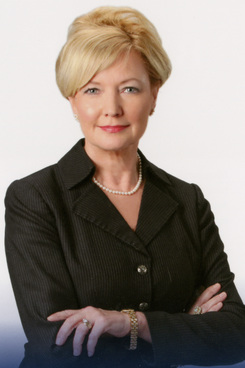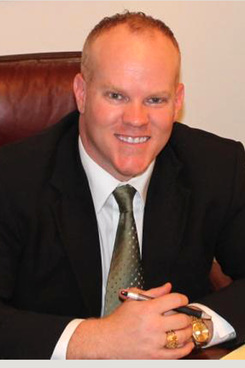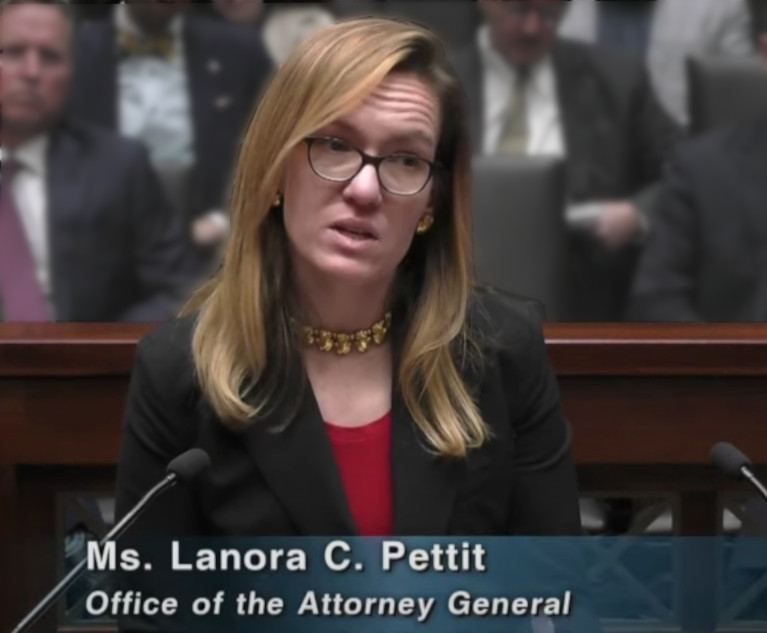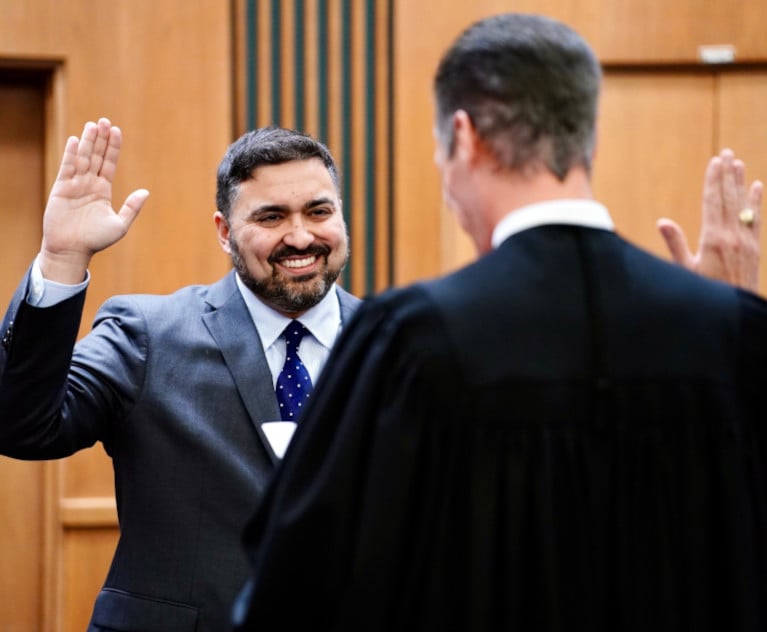Elizabeth Beach, Brian Walker Vie for Justice of Fort Worth's Second Court in Primary Runoff
Judge Elizabeth Beach claims her years as a trial judge better qualify her, but opponent Brian Walker argues that his appellate law experience is more extensive.
June 21, 2020 at 12:45 PM
10 minute read
 Elizabeth Beach and Brian Walker.
Elizabeth Beach and Brian Walker.
In the runoff to become a justice on Fort Worth's Second Court of Appeals, Judge Elizabeth Beach claims her years as a trial judge better qualify her, but opponent Brian Walker argues that his appellate law experience is more extensive.
The pair is competing in the July 14 Republican Primary runoff to become the Second Court's justice for Place 7. There's no Democrat candidate running in November, which means the runoff winner gets the bench.
"I have been an attorney for 39 years, and he has only 15 years of experience," Beach wrote in an email. "I have been a sitting district judge for seven years, and he has no judicial experience."
But Walker wrote that appellate experience is the No. 1 qualification for the Second Court Bench.
"I have an extensive amount of appellate experience and my opponent does not," Walker wrote. "In fact, I have authored well over 100 appellate briefs in state and federal court while my opponent, according to the state appellate database, has never authored a single appellate brief."
Texas Lawyer is publishing Q&As with the judicial candidates who are competing in primary runoffs. Early voting runs from June 29 to July 10, and election day is July 14.
Here are the Q&As for Beach and Walker.
Read more: Texas Voters: Meet the Candidates Running for Judge in July Primary Runoffs
Elizabeth Beach
What is a brief biography of work experience, educational qualifications and career honors that you want voters to know about?
 Judge Elizabeth Beach
Judge Elizabeth BeachI have been a criminal district judge for six years. Before that, I was a felony chief prosecutor. I have been an adjunct professor of criminal justice at TCU for 26 years. I have been an attorney for 38 years. I prosecuted the first case in Texas using DNA evidence to convict a criminal in 1988.
Why do you want this position?
I would like to serve this court and apply my criminal and civil experience—there is a need for judicial criminal experience on this court.
How are you different or better suited for the bench than your opponent?
I am better suited for the office of Justice on the Second Court of Appeals than my opponent in that:
- I have been a sitting district judge for seven years, and he has no judicial experience.
- I have been an attorney for 39 years, and he has only 15 years of experience as an attorney.
I am different from my opponent, in that:
- I graduated from the University of Texas School of Law at age 23.
- I have been an adjunct professor of criminal justice at Texas Christian University for 26 years.
How would you go about managing this court's docket efficiently and effectively?
By applying the same organizational skills I have used in my current court to manage an efficient court docket.
Where can voters go for more information about you?
- Resume
Brian Walker
What is a brief biography of work experience, educational qualifications and career honors that you want voters to know about?
 Brian K. Walker
Brian K. WalkerI have been a successful military and veteran's law, criminal law, and civil law attorney for over 15 years. I have authored approximately 100 civil and criminal appeals, and I have served as first chair attorney in over 70 civil and criminal jury trials. I have won countless awards in the legal profession. While I was still in my 30s, I was selected by this publication, Texas Lawyer, as a "Lawyer on the Rise," which is given to the top 20 attorneys in Texas under the age of 40. I was one of only two attorneys in private practice to receive that award in 2016. I was the co-founder and former Chairman of the Tarrant County Bar Association's branch of the Texas Lawyers for Texas Veterans (TLTV) pro bono project for military veterans. I was given the leadership award by the TLTV program in 2012 for my service as that group's leader and for my extensive pro bono contributions and service to military veterans.
I am a former state criminal prosecutor, and I am a former judge advocate (JAG) in the United States Air Force Reserve. I ended my Reserve commitment with the USAF at the end of 2019. I served over nine years as a JAG, and I served overseas on multiple occasions for lengthy periods of time. Most recently, I was assigned to do my annual reserve duty for three years at Aviano Air Base in Northern Italy. In addition to serving as a JAG, I made Air Force history by becoming the first JAG in the entire Air Force to ever serve as a drill instructor at the U.S. Air Force Officer Training School. While serving in that capacity for almost half of 2014, I trained officer cadets in leadership, Air Force history and principles, drill and ceremonies, esprit de corps, and other aspects of being a United States Air Force Officer.
I have been involved in political races for many years. Most recently, I served as my father's (Judge Scott Walker) political consultant and campaign manager in his successful bid for the supreme criminal court in Texas, the Texas Court of Criminal Appeals. In 2008, I ran for the Texas House of Representatives. Although I secured the Republican nomination, raised over $400,000 in campaign contributions, and was endorsed by many notable organizations and individuals, such as Ed Meese, the United States Attorney General under President Ronald Reagan, I lost the general election to the four-term incumbent by only 120 votes out of all votes cast in that four-county district. While attending Texas State University in San Marcos in the late '90s, I served as an intern on the first Bush/Cheney presidential campaign, as an Assistant Sergeant-at-Arms with the Texas Senate, and as a Senate Messenger.
Why do you want this position?
First, because I feel led to seek it. I am a Christian, and I try to seek God's will for my life in all of the big decisions that I make. I began feeling led to seek this position as soon as I heard that Justice Gabriel was retiring and, after seasoning it with a great deal of prayer, I felt certain that I was supposed to run for her vacant spot. Second, I feel I can make a substantial impact on the court by being faithful to the law and by putting my values at the helm of my decision-making. Third, I have seen a great deal of what my dad has done in his job on the Texas Court of Criminal Appeals. Seeing what he does as an appellate judge, from my vantage point as his son, has given me a deep passion for serving as an appellate judge.
How are you different or better suited for the bench than your opponent or opponents?
The Second Court of Appeals is strictly an appellate court. I believe appellate experience is the number one qualification for an appellate judge. I have an extensive amount of appellate experience and my opponent does not. In fact, I have authored well over 100 appellate briefs in state and federal court while my opponent, according to the State appellate database, has never authored a single appellate brief. While it is my understanding that my opponent hasn't received a single major group endorsement, I have been endorsed by Texas Values Action, True Texas Project, the Texas Homeschool Coalition, Texans for Life, the DFW Conservatives PAC, the Denton County Conservative Coalition, and the Parker County Conservatives PAC.
Beyond appellate experience and endorsements, there are other areas that distinguish me from my opponent. I have a wide breadth of experience at the trial level. I have sat first chair in over 75 civil and criminal jury trials. I'm a former assistant district attorney, a seasoned criminal defense attorney, and I've handled civil litigation matters for a large part of my legal career. Additionally, I served my nation in uniform as a judge advocate in the USAFR for nine years and was the first JAG in the history of the Air Force to serve as a drill instructor at USAF Officer Training School. All of my qualifications can be found at www.voteforwalker.com. It appears that the voters agreed that I'm better qualified for this position because I came in first place in all 12 counties in the primary, and I received over 25,500 more votes than my opponent.
How would you go about managing this court's docket efficiently and effectively?
I would focus on three items:
- "Turn around time" on authoring opinions. Once judges are assigned opinions, the amount of time they spend researching, analyzing and ultimately writing them can be tracked. Although a rushed product can hurt the quality of an opinion, judicial efficiency is still an important part of good stewardship. Accordingly, I would always stay mindful of the "turn around time" on the opinions that I authored and compare the timing with other judges throughout the 14 courts of appeals in Texas.
- "Turn around time" for the various steps in doing the above. Each legal opinion has various steps in it's life cycle. There are the research steps that go into an opinion, there are the analysis steps that take place throughout an opinion's life cycle, and there are the various steps in authorship that take place in an opinion's life cycle. The various points in the actual drafting of a legal opinion include the rough draft, the working copy that circulates among the judges and the final product. I would create ways to track and compare the "turn around time" for all of those various steps in the authorship process.
- Office expenses. In my opinion, this is somewhat of a "no-brainer." We are called to be good stewards in life, and public servants most definitely have a duty to be good stewards of public resources. Accordingly, I would monitor the costs of running my office and do everything I could to run things in a financially prudent way.
Where can voters go for more information about you?
- Website: www.voteforwalker.com - Facebook - Resume
This content has been archived. It is available through our partners, LexisNexis® and Bloomberg Law.
To view this content, please continue to their sites.
Not a Lexis Subscriber?
Subscribe Now
Not a Bloomberg Law Subscriber?
Subscribe Now
NOT FOR REPRINT
© 2025 ALM Global, LLC, All Rights Reserved. Request academic re-use from www.copyright.com. All other uses, submit a request to [email protected]. For more information visit Asset & Logo Licensing.
You Might Like
View All


Trending Stories
- 1Uber Files RICO Suit Against Plaintiff-Side Firms Alleging Fraudulent Injury Claims
- 2The Law Firm Disrupted: Scrutinizing the Elephant More Than the Mouse
- 3Inherent Diminished Value Damages Unavailable to 3rd-Party Claimants, Court Says
- 4Pa. Defense Firm Sued by Client Over Ex-Eagles Player's $43.5M Med Mal Win
- 5Losses Mount at Morris Manning, but Departing Ex-Chair Stays Bullish About His Old Firm's Future
Who Got The Work
J. Brugh Lower of Gibbons has entered an appearance for industrial equipment supplier Devco Corporation in a pending trademark infringement lawsuit. The suit, accusing the defendant of selling knock-off Graco products, was filed Dec. 18 in New Jersey District Court by Rivkin Radler on behalf of Graco Inc. and Graco Minnesota. The case, assigned to U.S. District Judge Zahid N. Quraishi, is 3:24-cv-11294, Graco Inc. et al v. Devco Corporation.
Who Got The Work
Rebecca Maller-Stein and Kent A. Yalowitz of Arnold & Porter Kaye Scholer have entered their appearances for Hanaco Venture Capital and its executives, Lior Prosor and David Frankel, in a pending securities lawsuit. The action, filed on Dec. 24 in New York Southern District Court by Zell, Aron & Co. on behalf of Goldeneye Advisors, accuses the defendants of negligently and fraudulently managing the plaintiff's $1 million investment. The case, assigned to U.S. District Judge Vernon S. Broderick, is 1:24-cv-09918, Goldeneye Advisors, LLC v. Hanaco Venture Capital, Ltd. et al.
Who Got The Work
Attorneys from A&O Shearman has stepped in as defense counsel for Toronto-Dominion Bank and other defendants in a pending securities class action. The suit, filed Dec. 11 in New York Southern District Court by Bleichmar Fonti & Auld, accuses the defendants of concealing the bank's 'pervasive' deficiencies in regards to its compliance with the Bank Secrecy Act and the quality of its anti-money laundering controls. The case, assigned to U.S. District Judge Arun Subramanian, is 1:24-cv-09445, Gonzalez v. The Toronto-Dominion Bank et al.
Who Got The Work
Crown Castle International, a Pennsylvania company providing shared communications infrastructure, has turned to Luke D. Wolf of Gordon Rees Scully Mansukhani to fend off a pending breach-of-contract lawsuit. The court action, filed Nov. 25 in Michigan Eastern District Court by Hooper Hathaway PC on behalf of The Town Residences LLC, accuses Crown Castle of failing to transfer approximately $30,000 in utility payments from T-Mobile in breach of a roof-top lease and assignment agreement. The case, assigned to U.S. District Judge Susan K. Declercq, is 2:24-cv-13131, The Town Residences LLC v. T-Mobile US, Inc. et al.
Who Got The Work
Wilfred P. Coronato and Daniel M. Schwartz of McCarter & English have stepped in as defense counsel to Electrolux Home Products Inc. in a pending product liability lawsuit. The court action, filed Nov. 26 in New York Eastern District Court by Poulos Lopiccolo PC and Nagel Rice LLP on behalf of David Stern, alleges that the defendant's refrigerators’ drawers and shelving repeatedly break and fall apart within months after purchase. The case, assigned to U.S. District Judge Joan M. Azrack, is 2:24-cv-08204, Stern v. Electrolux Home Products, Inc.
Featured Firms
Law Offices of Gary Martin Hays & Associates, P.C.
(470) 294-1674
Law Offices of Mark E. Salomone
(857) 444-6468
Smith & Hassler
(713) 739-1250







